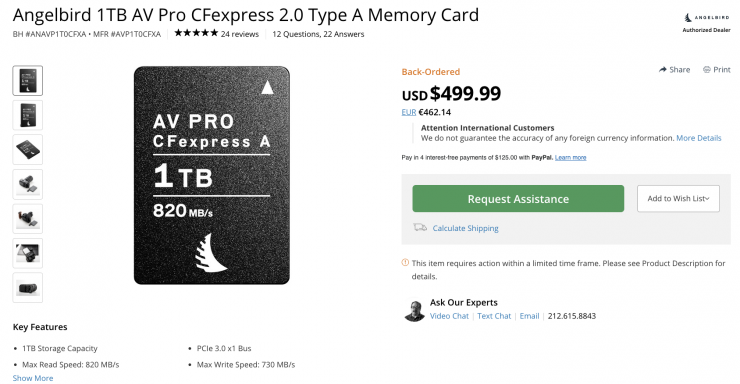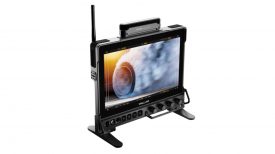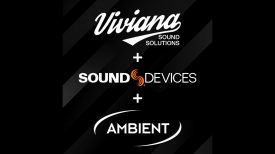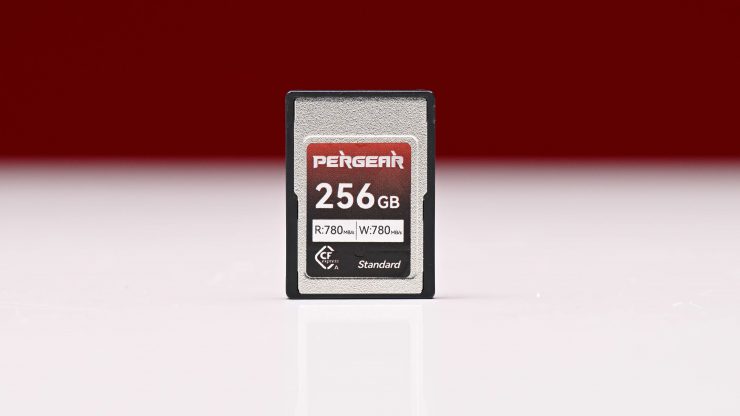
The Pergear Standard Series 256GB CFexpress Type A card was designed to be a well-performing and cost-effective solution for select Sony cameras.
According to Pergear, the card was specially designed for high-resolution video recording, and it can handle continuous recording of 8K RAW. It is claimed to provide maximum read speeds up to 780 MB/s, write speeds up to 780 MB/s, and a sustained write speed 380MB/s.
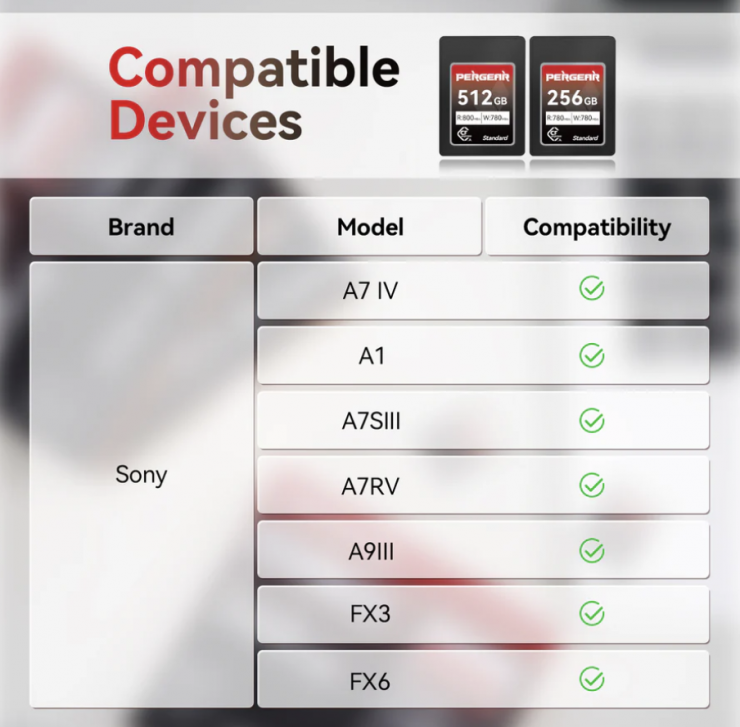
The card is compatible with the following Sony Alpha & FX Cameras:
- A7 IV
- A7SIII
- A7RV
- FX3
- FX6
- A9III
- A1
It took quite a long time for companies other than Sony to start making CFexpress Type A cards, but now we have Exascend, Pergear, Angelbird, ProGrade, Delkin Devices, and Lexar providing third-party solutions.
In some ways, CFexpress Type A is a strange format because there are limitations to the capacities that can be made, and only a handful of cameras, which are all made by Sony, use this type of media.
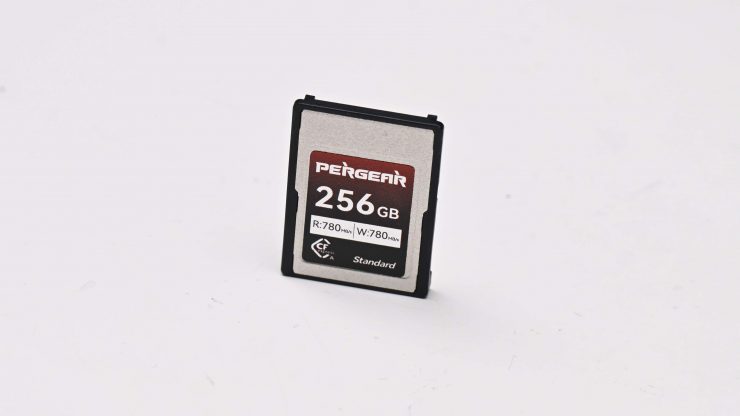
While we have recently seen the introduction of quite a few CFexpress 4.0 Type A cards, the Pergear is still a 2.0 card.
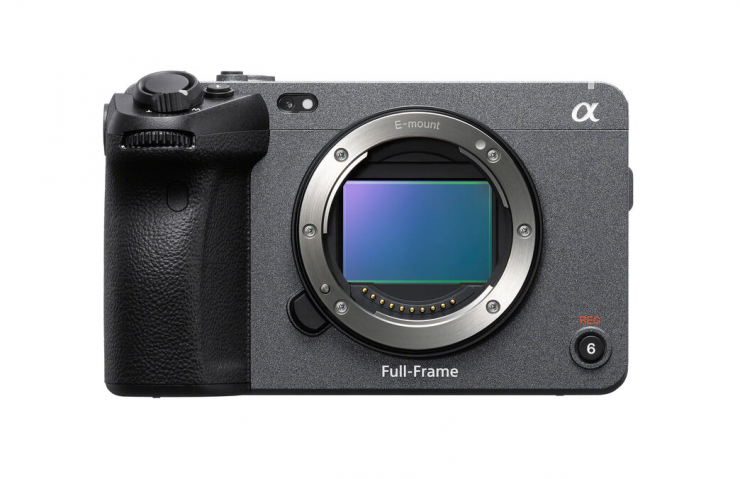
It isn’t a huge surprise that there are not a ton of options when it comes to CFexpress Type A cards, because you can currently only use the cards in Sony cameras such as the Sony a1, a7S III, A7 IV, A7V, FX30, FX3, and FX6. No other manufacturer, apart from Sony utilizes this type of recording media.
When CFExpress Type A cards were first announced they were only available in smaller-sized capacities, and initially, the highest capacity was limited to 160GB, but in the last few years, we have seen higher capacities being introduced.
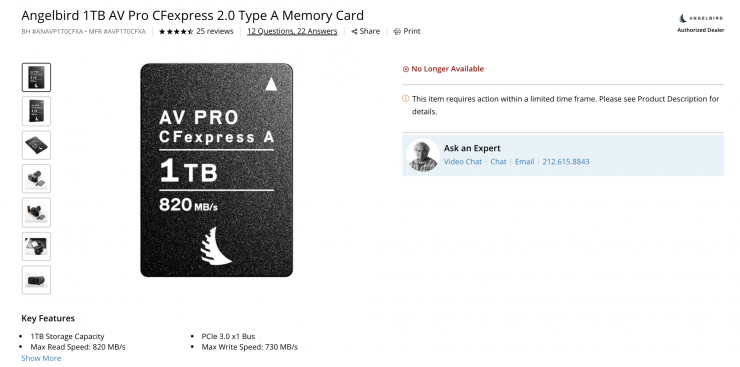
In April 2023, Angelbird announced its AV PRO 1TB card, which at the time was the highest capacity available on the market. Unfortunately, in a lot of places around the world, it was continually back ordered or out of stock and it has now been discontinued.
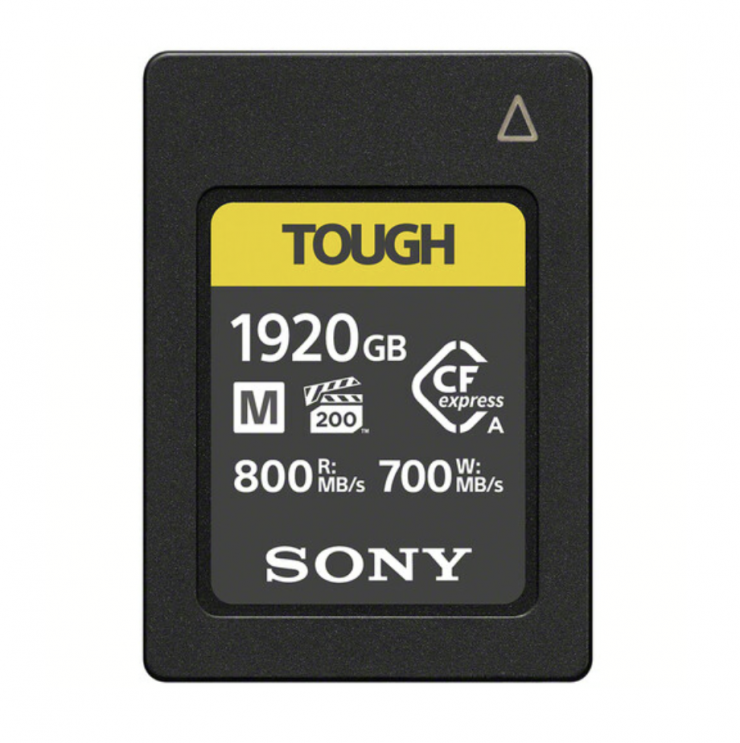
The largest capacity currently available is the Sony 1920GB CFexpress Type A TOUGH Memory Card ($1,398 USD).
Ok, let’s get back to the Pergear Standard Series 256GB CFexpress Type A Card.
Fast Speeds?
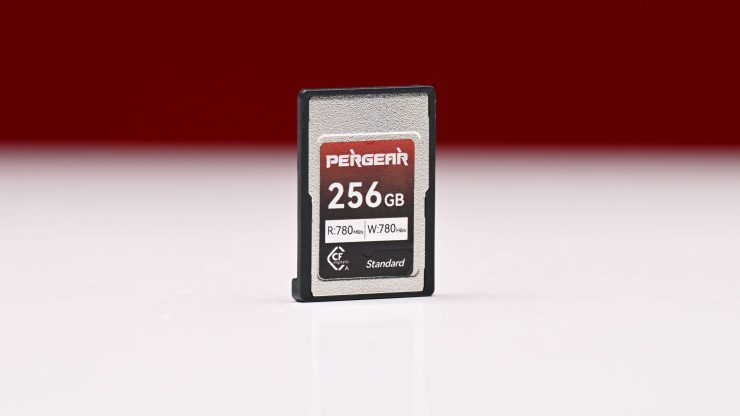
The Pergear Standard Series 256GB CFexpress Type A Card has claimed write speeds of up to 780MB/s and the sustained write speed is stated as being 380MB/s.
So how do these claim speeds compare to some of the similar capacity PCIe 2.0 cards, as well as Type 4.0 cards?
| READ SPEED | WRITE SPEED | |
| Pergear Standard Series 256GB | 780MB/s | 780MB/s |
| Pergear VPG200 Professional CFexpress Type A Memory Card (260GB) | 880MB/s | 400MB/s |
| Sony 320GB CFexpress Type A TOUGH | 800MB/S | 700MB/s |
| Lexar 320GB Professional CFexpress Type A Card GOLD Series | 900MB/s | 800MB/s |
| Lexar 320GB Professional CFexpress Type A Card SILVER Series | 800MB/s | 700MB/s |
| ProGrade Digital 240GB CFexpress 2.0 Type A Gold Memory Card | 900MB/s | 800MB/s |
| Exascend 240GB Essential Series | 700MB/s | 800MB/s |
| Exascend 256GB Essential Pro CFexpress 4.0 Type A | 1650 MB/s | 1800 MB/s |
| Wise Advanced 256GB CFexpress 4.0 | 1865MB/s | 1750MB/s |
| Angelbird AV PRO CFexpress A SE 330GB | 820MB/s | 730MB/s |
What you clearly need to be aware of is that these listed speeds are largely irrelevant in the real world and you are not going to see maximum read or write speeds. The most important speed to try and find out is sustained write speeds which are generally a lot lower than maximum speeds. Unfortunately, some manufacturers don’t quote sustained speeds.
So what are the minimum sustained write speeds of the cards? Well, below you can see the ones that I was able to find information about.
Please note that this is the minimum guaranteed write speed and it is not necessarily as high as what you will get in the real world.
Capacity
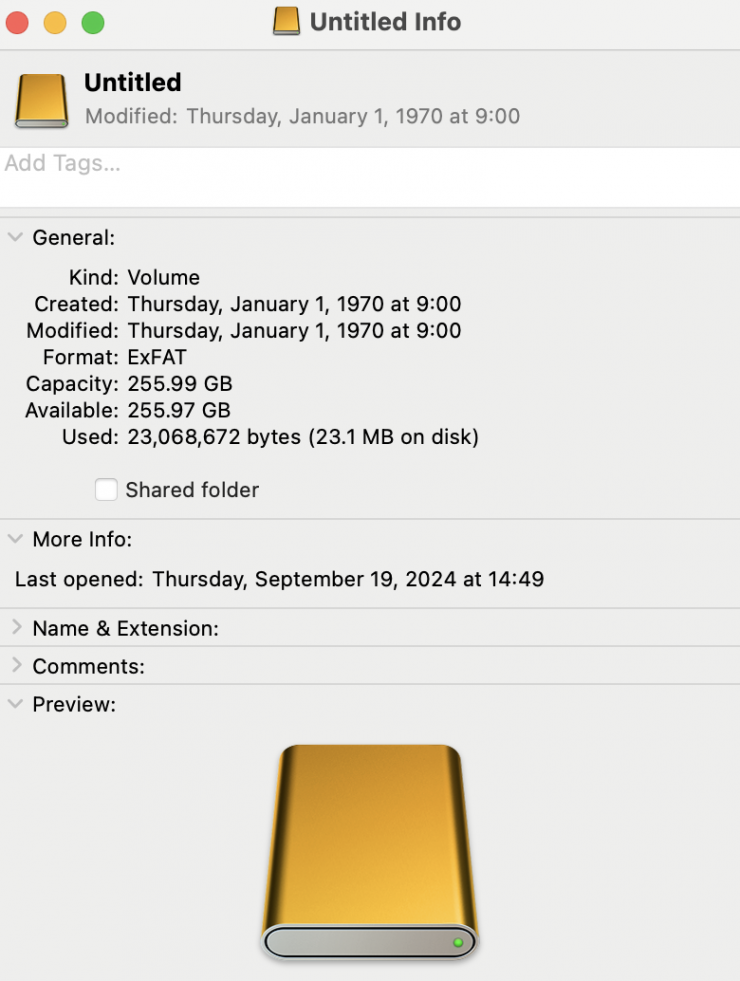
I had a look at the capacity of the card on a Mac and it showed 255.97TB.
If you were recording UHD 4K (3840 x 2160) at 59.94 fps in H.264/XAVC S-I 4:2:2 10-Bit on the Sony a7R V a 256GB card would allow you to record for just over an hour.
If you were recording UHD 4K (3840 x 2160) at 23.98p in H.265/XAVC HS 4:2:2 10-Bit the card would allow you to record for only around 12 minutes.
Record 8K

The Pergear Standard Series 256GB CFexpress Type A Card should be capable of recording 8K and 4K high frame rate material from the Sony a1 and Sony a7V.
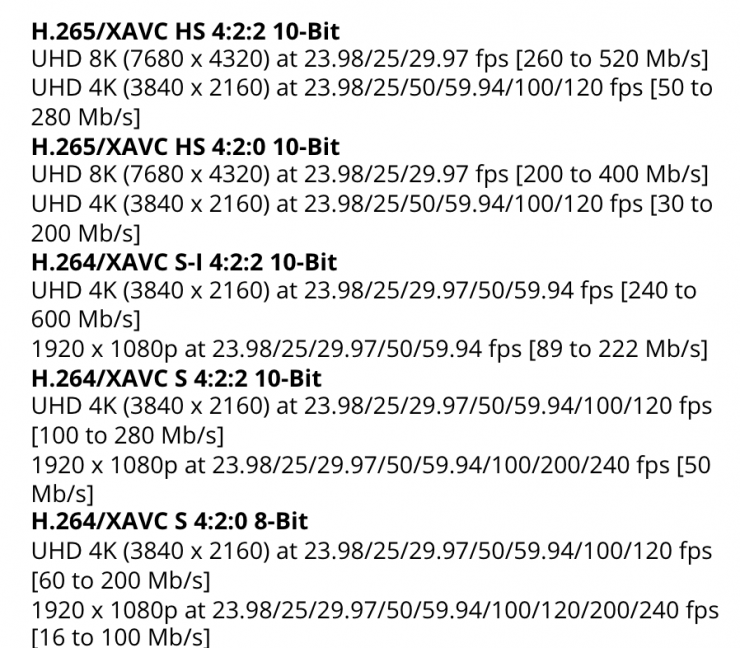
Above you can see the recording data rates listed by Sony for the a1. The maximum bitrate is 520Mb/s (65 MB/s). As the minimum sustained write speed is listed as 380MB/s, the card should be easily capable of recording 8K XAVC HS 4:2:2 10-bit material without breaking a sweat.

Above you can see the recording data rates for the Sony FX6. The Pergear card would be able to handle anything you can throw at it.
Having a card with a decent capacity allows you to record for long periods of time, and that it one of the drawbacks of using a 256GB card. On the highest quality 4K setting on the Sony FX3 you could record for around 33 minutes of 4K 25p material. This is not long, and you would need quite a lot of cards to get you through a shooting day depending on what you are doing.
Fast Media Offload
What you clearly need to remember, and this goes for any type of media, is that transfer speeds will vary depending on both the read and write speeds of your card, your card reader, your computer, and what type of hard drive you are transferring to.
If you are using a CFexpress Type A card and transferring to an HDD drive, you won’t be getting fast transfer speeds. If you are transferring to a very fast SSD/NVMe then you will see lightning-fast offload speeds.
Real World speed tests
I did a few tests to see what the sustained read/write speeds of the Pergear Standard Series 256GB CFexpress Type A Card were. For the test, I was using an M1 MacBook Pro and a Wise CFexpress 4.0 Type A Card Reader.
Pergear Standard Series 256GB CFexpress Type A
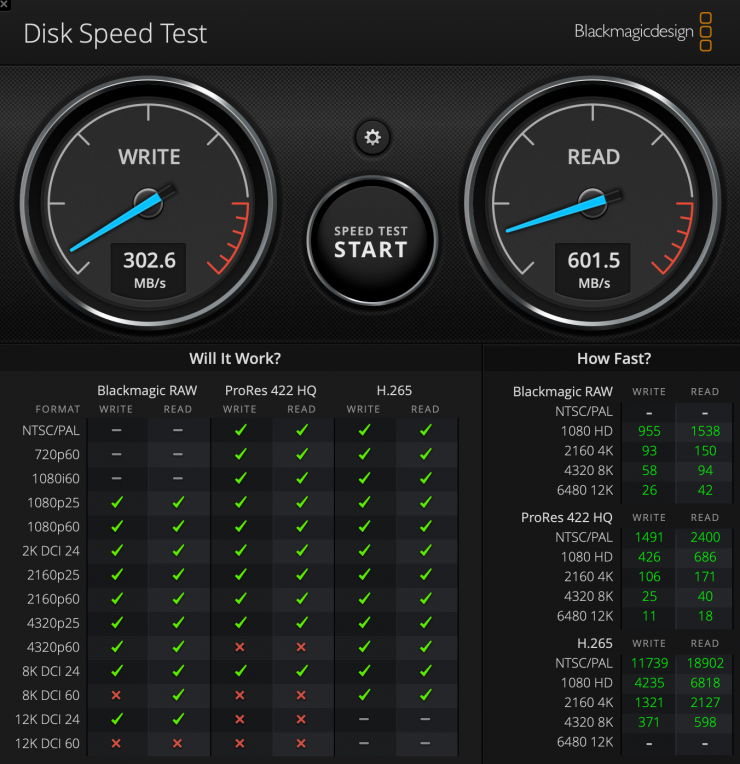
Above you can see the results for the Pergear Standard Series 256GB CFexpress Type A with the stress set to 5GB. I got a sustained write speed of 302.6MB/s and a sustained read speed of 601.5MB/s.
Exascend 1TB Essential Pro CFexpress 4.0 Type A
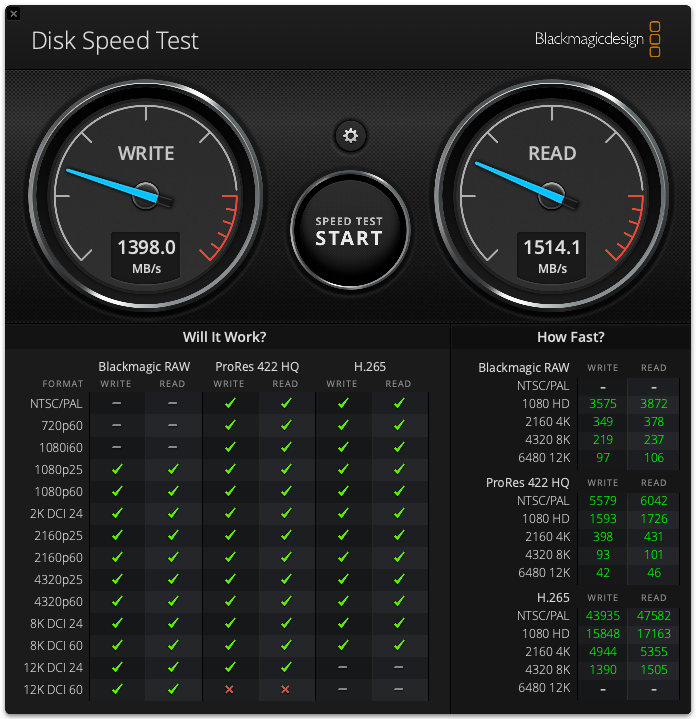
As a comparison, above you can see the results for the Exascend 1TB Essential Pro CFexpress 4.0 Type A card with the stress set to 5GB. I got a sustained write speed of 1,398MB/s and a sustained read speed of 1514.1MB/s.
Exascend 1TB Essential
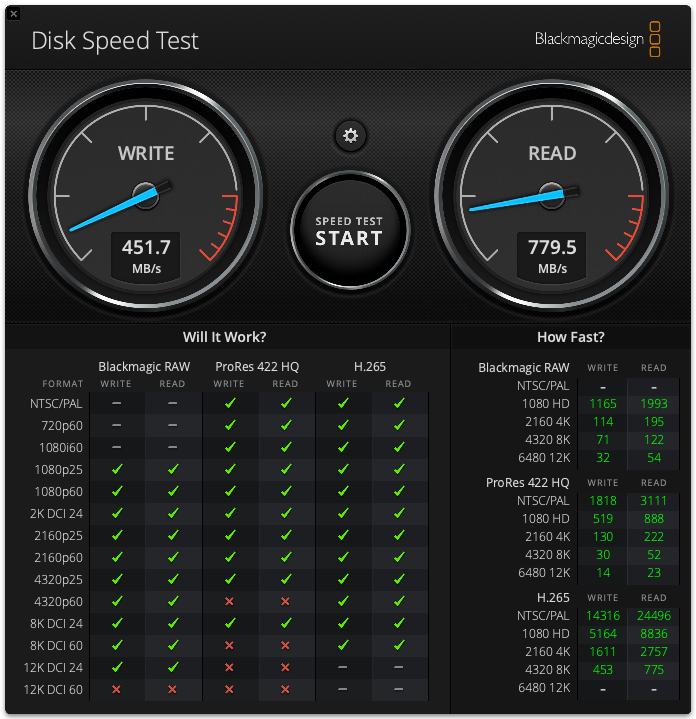
As another comparison, above you can see the results for the Exascend 1TB Essential card with the stress set to 5GB. I got a sustained write speed of 451.7MB/s and a sustained read speed of 779.5MB/s.
Pergear Standard Series 256GB CFexpress Type A
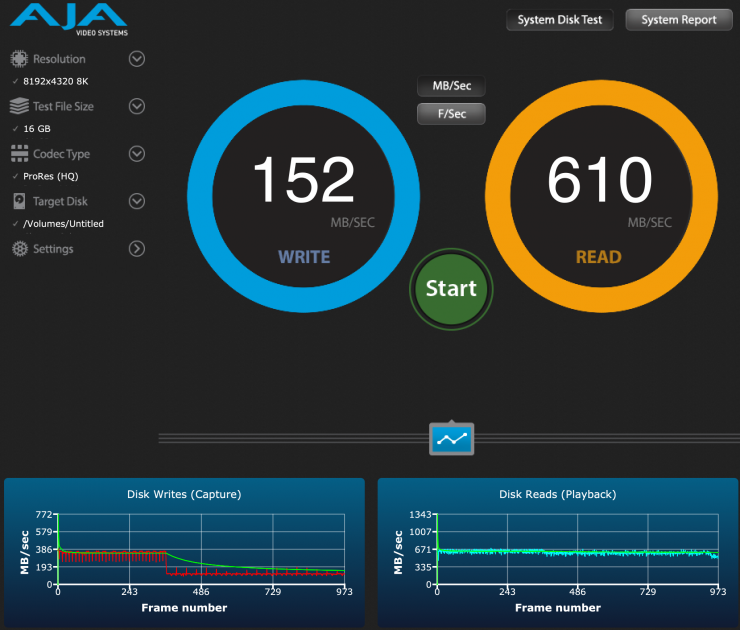
I also tested the Exascend 1TB Essential Pro CFexpress 4.0 Type A using the AJA System Test Lite software under a 16GB load to see what the read and write speeds were. The sustained write speed was 152MB/s and the sustained write speed was 610MB/s. The minimum write speed recorded was just 91 MB/Sec.
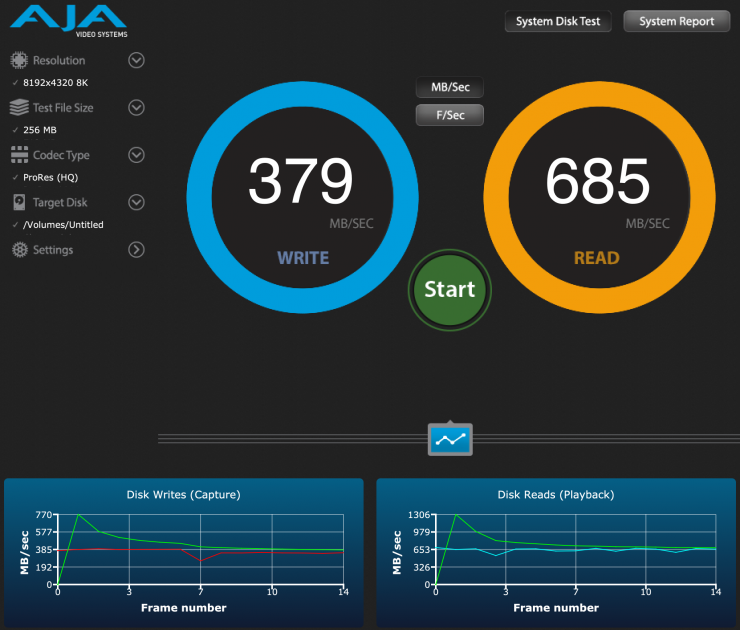
I also tested it under a 256GB load and the sustained write speed was 379MB/s and the sustained write speed was 685MB/s. The minimum write speed recorded was 259 MB/Sec.
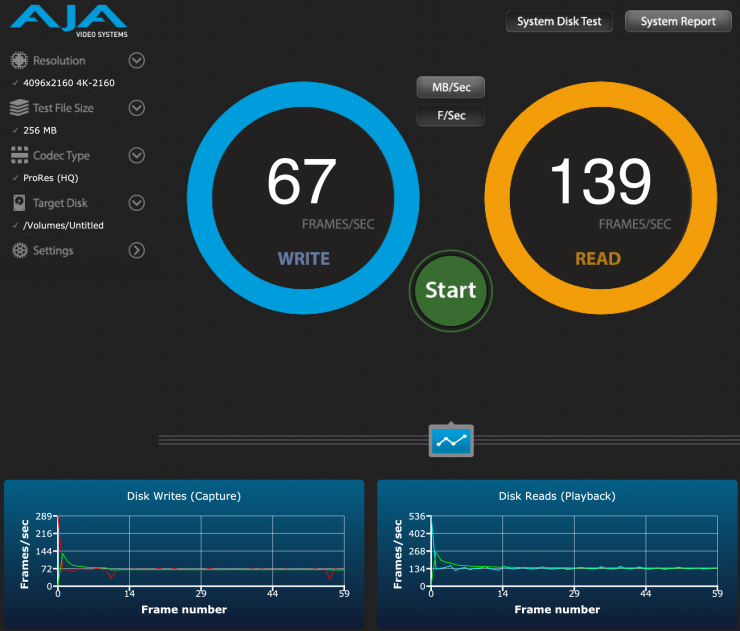

256MB Load 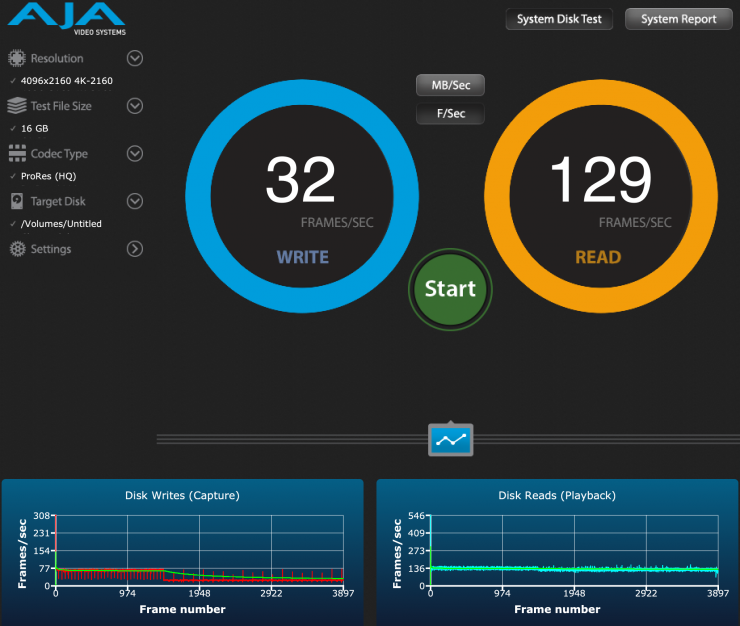
16GB Load
Above you can see how many frames per second it could handle when recording 4K DCI in ProRes 422HQ under the same test conditions.
The results I obtained during all of these tests clearly show that the card is easily capable of recording 8K 29.98p H.265/XAVC HS 4:2:2 10-Bit. The maximum data rate when recording 8K 29.98p on the Sony a1 is 520 Mb/s. It can also easily handle 8K 25p from the Sony a7V.
Ok, what about if we load up the card with recorded files (about 70% full) and have a look at how it performs? As you can see the average write and read speeds did decrease. The min. write speed recorded was just 158MB/s, however, the sustained write speed was 419MB/s which was above the advertised min. sustained speed of 400MB/s. This test clearly shows me that the card’s performance does take a hit once you have a decent amount of recorded data on it.
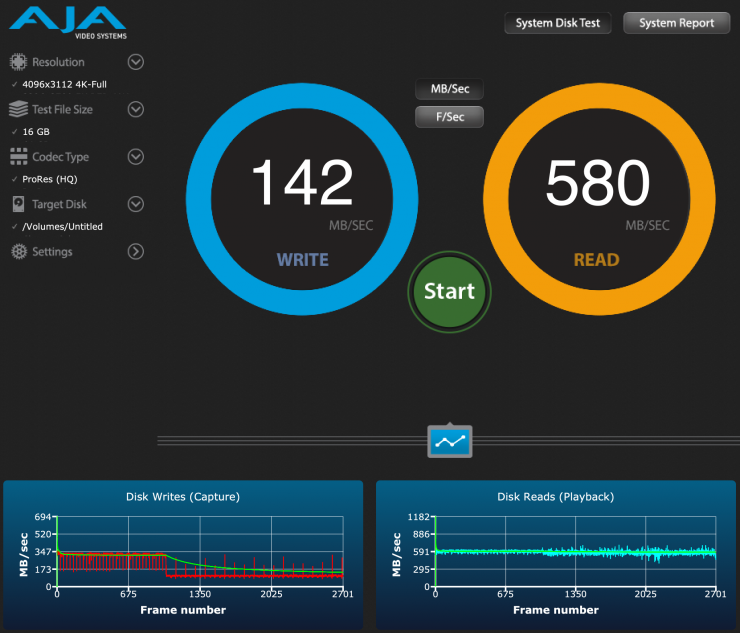

16GB Load 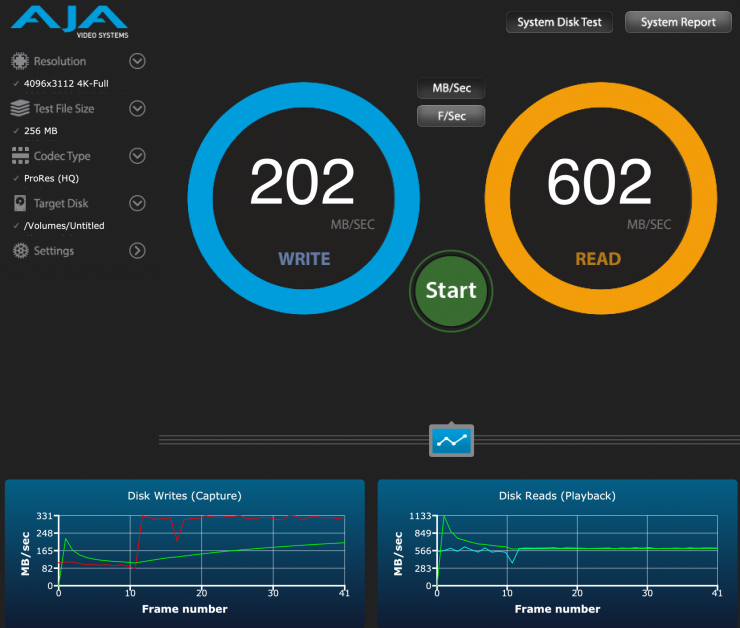
256MB Load
Let’s do one more test with the loaded-up card with recorded files (about 80% full) and have a look at how it performs with the test file size set to 256MB and then 16GB? As you can see the average write speed did drop but not by much. The min. write speed recorded was 86 MB/Sec when the test was done at 256MB and 77 MB/Sec when it was set at 16GB.
Can you use a CFexpress Type A card in a camera that takes CFexpress Type B cards?
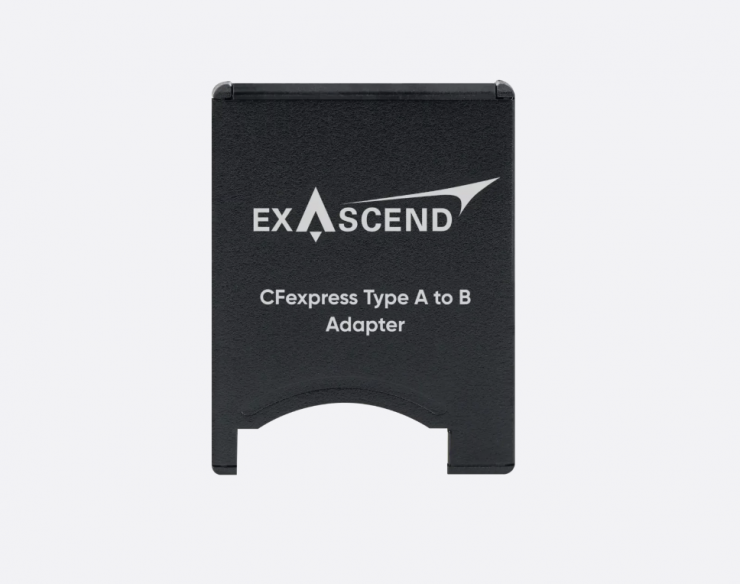
What the? You may be asking how this is possible. Well, Exascend makes a CFexpress Type B to Type A adapter, that allows this to work.
Now, unfortunately, the Pergear Standard Series 256GB CFexpress Type A Card didn’t fit correctly into this adapter and it wouldn’t work. This is very strange as I have had no issues using Type A cards from other manufacturers in this adapter. It was only the Pergear that wouldn’t work.
Price & availability
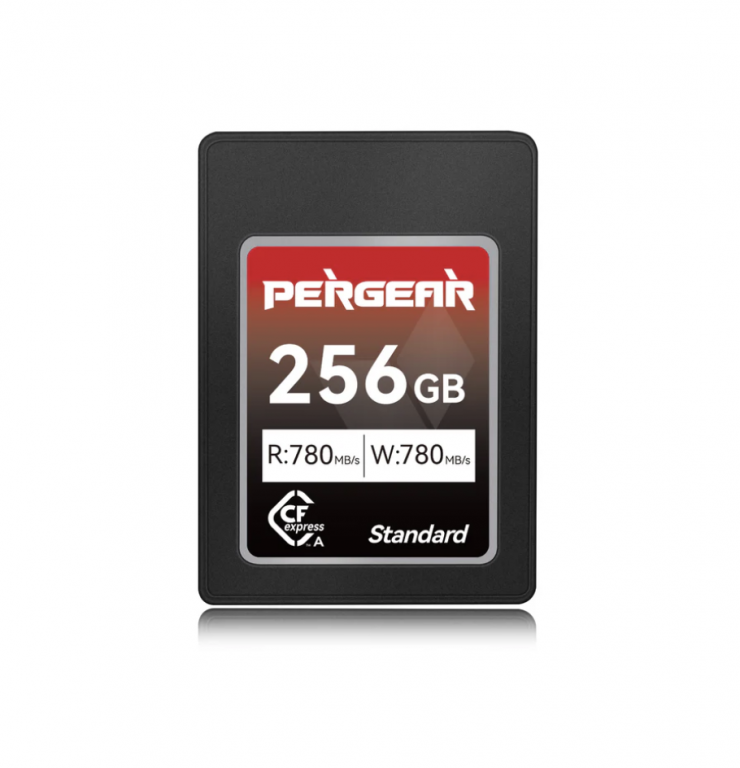
The Pergear Standard Series 256GB CFexpress Type A Card is available to purchase for $103.20 USD.
How does the price compare to the competition?
*Currently on sale at B&H (as of the 19th September 2024)
Conclusion
If you own any of the Sony cameras that utilize CFexpress Type A cards, then the Pergear Standard Series 256GB offers good performance at an affordable price. It has decent sustained read and write speeds and the card can handle anything you want to throw at it.
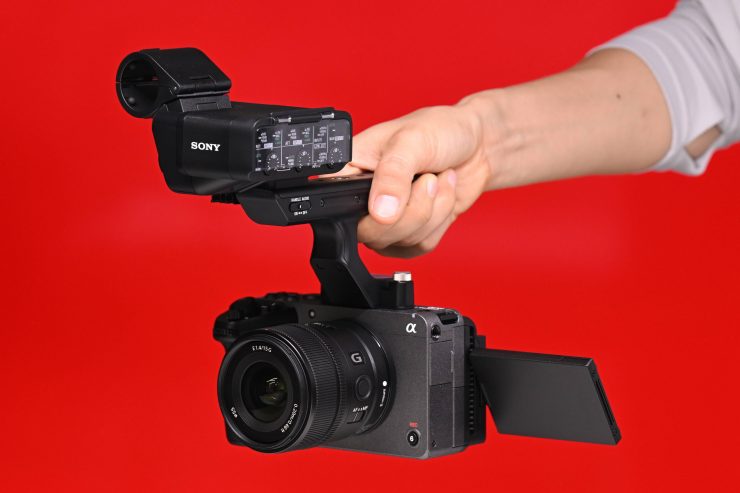
The card worked flawlessly in all of the cameras I tried it with and that’s about all you can ask. Yes, it only has CFexpress 2.0 card speeds, but currently those speeds ae more than enough to easily handle any current camera that utilizes CFexpress Type A cards.
It is arguably hard to recommend the card, not because there is anything wrong with it, but because you can now get CFexpress Type A 4.0 cards which have much faster offload speeds for not much more money. However, if you do need a CFexpress Type A card for occasional recording of higher bitrate or higher resolution material then at just over $100 USD it makes for a very affordable solution.

